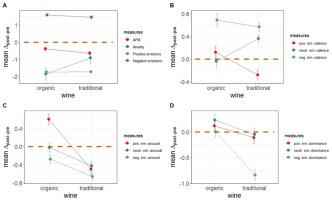The cognitive-emotional dynamics of organic versus traditional wines: A comparative study
IF 3.6
2区 农林科学
Q2 FOOD SCIENCE & TECHNOLOGY
International Journal of Gastronomy and Food Science
Pub Date : 2025-09-13
DOI:10.1016/j.ijgfs.2025.101298
引用次数: 0
Abstract
In this study, we analyzed the cognitive and emotional effects of organic and traditional wines on a group of regular wine consumers (n = 129). Previous research has demonstrated that alcoholic beverages negatively impact the central nervous system, particularly the prefrontal cortex (PFC) and amygdala, which play critical roles in cognitive functions such as fluid intelligence, as well as in emotion perception and recognition. Organic wine is primarily distinguished by its lower concentrations of sulfites and malic acid. To assess the cognitive and emotional effects of organic wine, we compared changes in measures of fluid intelligence, state anxiety, and emotional reactions to International Affective Picture System (IAPS) images before and after consumption. Alcohol is known to impair cognitive-emotional processes by reducing attention quality, reasoning capacity, and levels of anxiety and emotional arousal. However, our findings indicated that organic wine exerted a less pronounced negative effect on these processes. Specifically, after consuming organic wine, participants exhibited less impairment in fluid intelligence and a milder effect on emotional arousal and dominance in response to IAPS images. Notably, no significant changes were observed in state anxiety or perceived emotions. These results, when considered alongside previous literature, suggest that organic wine has a lower detrimental impact on the amygdala and, particularly, the PFC. This may be attributed to the reduced levels of sulfites in organic wine, as PFC functionality appears especially susceptible to their effects.

有机葡萄酒与传统葡萄酒的认知-情感动态:比较研究
在这项研究中,我们分析了有机葡萄酒和传统葡萄酒对一组普通葡萄酒消费者(n = 129)的认知和情感影响。先前的研究表明,酒精饮料会对中枢神经系统产生负面影响,尤其是前额叶皮层(PFC)和杏仁核,它们在认知功能(如流体智力)以及情绪感知和识别中起着至关重要的作用。有机葡萄酒的主要特点是其亚硫酸盐和苹果酸的浓度较低。为了评估有机葡萄酒对认知和情感的影响,我们比较了饮用前后液体智力、状态焦虑和对国际情感图像系统(IAPS)图像的情绪反应的变化。众所周知,酒精会损害认知-情绪过程,降低注意力质量、推理能力、焦虑和情绪唤醒水平。然而,我们的研究结果表明,有机葡萄酒对这些过程的负面影响不太明显。具体来说,在饮用有机葡萄酒后,参与者表现出较少的流体智力损伤,对IAPS图像的情绪唤醒和支配性的影响也较温和。值得注意的是,在状态焦虑或感知情绪方面没有观察到明显的变化。这些结果,与之前的文献一起考虑,表明有机葡萄酒对杏仁核,特别是PFC的有害影响较低。这可能归因于有机葡萄酒中亚硫酸盐水平的降低,因为PFC的功能似乎特别容易受到它们的影响。
本文章由计算机程序翻译,如有差异,请以英文原文为准。
求助全文
约1分钟内获得全文
求助全文
来源期刊

International Journal of Gastronomy and Food Science
Social Sciences-Cultural Studies
CiteScore
5.30
自引率
10.50%
发文量
170
审稿时长
45 days
期刊介绍:
International Journal of Gastronomy and Food Science is a peer-reviewed journal that explicitly focuses on the interface of food science and gastronomy. Articles focusing only on food science will not be considered. This journal equally encourages both scientists and chefs to publish original scientific papers, review articles and original culinary works. We seek articles with clear evidence of this interaction. From a scientific perspective, this publication aims to become the home for research from the whole community of food science and gastronomy.
IJGFS explores all aspects related to the growing field of the interaction of gastronomy and food science, in areas such as food chemistry, food technology and culinary techniques, food microbiology, genetics, sensory science, neuroscience, psychology, culinary concepts, culinary trends, and gastronomic experience (all the elements that contribute to the appreciation and enjoyment of the meal. Also relevant is research on science-based educational programs in gastronomy, anthropology, gastronomic history and food sociology. All these areas of knowledge are crucial to gastronomy, as they contribute to a better understanding of this broad term and its practical implications for science and society.
 求助内容:
求助内容: 应助结果提醒方式:
应助结果提醒方式:


